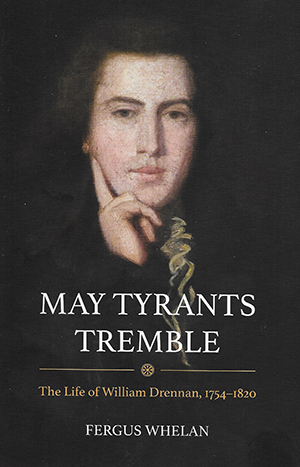MAY TYRANTS TREMBLE: the life of William Drennan, 1754–1820
Published in Book Reviews, Book Reviews, Issue 6 (November/December 2020), Reviews, Volume 28FERGUS WHELAN
Irish Academic Press
€29.95
ISBN 9781788551212
Reviewed by Tim Murtagh
Tim Murtagh is a research fellow with the Beyond 2022 Project, PRONI.
 There have recently been a number of biographies of United Irishmen: Kenneth Dawson’s biography of Samuel Neilson appeared in 2017 (The Belfast Jacobin, Irish Academic Press, 2017), while Jim Smyth’s short study of Henry Joy McCracken has only recently been published (Henry Joy McCracken, Life and Times New Series, UCD Press). To these we can now add Fergus Whelan’s latest offering, a profile of William Drennan (1754–1820).
There have recently been a number of biographies of United Irishmen: Kenneth Dawson’s biography of Samuel Neilson appeared in 2017 (The Belfast Jacobin, Irish Academic Press, 2017), while Jim Smyth’s short study of Henry Joy McCracken has only recently been published (Henry Joy McCracken, Life and Times New Series, UCD Press). To these we can now add Fergus Whelan’s latest offering, a profile of William Drennan (1754–1820).
Drennan was a doctor, a prolific poet and a pamphleteer who coined the description of Ireland as ‘the emerald isle’. He was a man who agitated for both parliamentary reform and Catholic Emancipation, a product of both the Enlightenment and New Light Presbyterianism. He was one of the primary figures in the creation of the United Irishmen, having been the first to propose the reform society as ‘a benevolent conspiracy—a plot for the people’. As well as being a founding member of the first Society of the United Irishmen in Belfast, he was one of the leading speakers in the sister society in Dublin.
Drennan left behind an impressive set of personal correspondence, long available in printed form. Given this availability, it is surprising that this is the first-ever book-length biography of Drennan. So, what does Whelan’s book bring to the table?
First off, it should be stated that Whelan relies mainly on printed sources, which is understandable, given the nature of Drennan’s correspondence. While this book presents little archival material that is new, it does conveniently synthesise a body of secondary work of which a general readership may be unaware. In doing so, Whelan provides a highly readable narrative, if a somewhat idiosyncratic one. Beginning with Drennan’s upbringing, the first three chapters examine the influence of Drennan’s father, Thomas, a Presbyterian minister. As a ‘son of the manse’, the young William was immersed in the world of Presbyterian debate and scholarship. Notably, Drennan’s father was a close friend of Francis Hutcheson, a leading moral philosopher and a man widely considered the father of the Scottish Enlightenment. Indeed, the strong political and intellectual link between Ulster and Scotland is a recurrent theme, from Hutcheson through to Drennan’s engagement with Scottish radicals like Thomas Muir in the 1790s. Whelan conveys the various strands within Presbyterian thought, although, tellingly, he heavily emphasises the role of English Commonwealth republicans like Milton and Sidney. He also stresses the theological currents associated with the growth of Unitarianism, a recurrent theme throughout Whelan’s publications. Most of all, however, the author makes a compelling case for the central role of radical dissent within Drennan’s political thought, a verdict that Drennan himself endorsed (p. 183).
The book does not always proceed in strict chronological order, with several asides examining key themes. For instance, over several chapters Whelan investigates the contrasting opinions and beliefs of Edmund Burke, whom he presents as a sort of foil to Drennan. Drennan’s first literary output was his 1780 A Letter to Edmund Burke, and the ‘open letter’ was a literary device to which he would return throughout his life. These sections analysing Drennan’s publications are probably the most original part of the book. This is most notable in the examination of the Letters of Orellana (1784), looking at their reception by friend and foe alike.
Moving into Drennan’s role in the United Irishmen in the 1790s, Whelan makes a compelling argument for his influence on the early organisation, in contrast to other accounts which typically privilege the role of Theobald Wolfe Tone. These chapters move dramatically towards the government’s prosecution of Drennan for seditious libel in 1794. While this trial features in multiple accounts of the 1790s, Whelan provides a closer look at how Drennan prepared his defence and the toll it took on him and his family. It also provides an alternative narrative concerning what occurred after the trial, when most accounts portray Drennan as withdrawing from radical politics. These years (1794–5) saw the United Irishmen reinvent themselves as a secret society dedicated to the establishment of an independent Irish republic. While Drennan was not a member of this more radical organisation, Whelan shows how he continued to contribute to United Irish publications, including some anonymous newspaper articles and poems in 1797–8 that dispel any image of Drennan as a moderate.
Whelan then elaborates on the work of Jonathan Wright to show how Drennan continued to push for radical reform in the post-Union period, returning to his native Belfast, where he helped set up the Belfast Academical Institution as well the Belfast Monthly Magazine (1808–14), a pioneering literary and political journal. These final chapters are short but very well written.
Disappointingly, Whelan declines to examine Drennan’s posthumous reputation. Drennan’s son, John Swanwick Drennan, grew up to be a liberal unionist, later invoking his father’s memory in opposition to Home Rule. An account of how Drennan subsequently featured in memory and writing about the 1790s would have been interesting. Perhaps this could be considered by the author as his next project? This reviewer would certainly be interested in reading it.
















